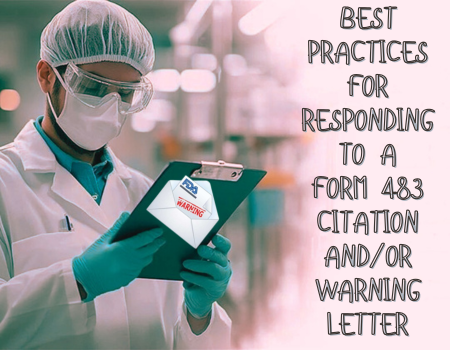Best Practices and Effective Strategies for Responding to FDA Form 483 Citations and Warning Letters
Speaker: Carolyn Troiano
Speaker Designation: FDA Compliance Consultant

Speaker: Carolyn Troiano
Speaker Designation: FDA Compliance Consultant

FDA has substantial authority to oversee regulated companies and their operations. The primary purpose of the FDA is to ensure safe and effective products that will protect public health. Violations can have seriously adverse effects on products, and ultimately, on patients and consumers.
The root of every company’s effort to defend its practices and products is through data and documentation, meaning both structured data (database) and unstructured data (documents, spreadsheets, presentations, audio, video, etc.). Computer systems used to house, collect, modify, analyze, report, transfer, or otherwise manage both structured and unstructured data must be validated in accordance with FDA requirements to assure data integrity. By not doing so, a company leaves itself exposed to FDA scrutiny and the possibility of Form 483 citations, or even more severe consequences.
Since 1953, FDA has been provided with the authority to conduct formal inspections of regulated companies, both announced and unannounced. During the inspection, an FDA auditor may have observed specific practices and/or reviewed specific data/documentation that is out of compliance with regulations. In this webinar, we will provide the most frequently cited issues to enable your company to get ahead of the curve and avoid a similar fate.
Writing an effective response that will minimize the possibility of further action by the FDA is a challenging task, and should be done very carefully. In this webinar, we’ll focus on the specific best practices required to ensure an adequate response. We will also review examples of good and bad responses to gain more insight and direction for creating one.
Finally, we will provide an overview and the key components of a good CAPA program. The CAPA is at the heart of a company’s response to the FDA’s findings and must be done appropriately.
Has your firm been issued one or more Form 483s by the FDA? Are you concerned about writing a successful response?
This webinar will provide you with the best practices for writing a solid response that will be well-received by the FDA and limit the company’s exposure to further regulatory action, such as a Warning Letter.
Attend the webinar to:
At the conclusion of an FDA inspection, and based on the observed findings, the auditor may provide a Form 483 citation, indicating the company has 15 days to respond if the response is to be considered when determining whether further action is needed. If the response is not adequate, this may lead to further enforcement action, which can be very costly and time-consuming. We will provide guidance for avoiding such a situation, or at least minimizing it by writing an effective Form 483 response to FDA.
The response takes all aspects of validation into account throughout the life of the system and the data that it houses. The data is a key asset for any FDA-regulated company and must be protected through its entire retention period.

Carolyn Troiano has more than 40 years of experience in computer systems and data in the pharmaceutical, medical device, tobacco, cannabis, and other FDA-regulated industries, as well as in banking, insurance, and government agencies. She is currently an independent consultant, advising companies on data integrity, privacy, and compliance, including implementing large-scale, complex systems, such as Enterprise Resource Planning (ERP), Customer Relationship Management (CRM), Clinical Trial Master File (TMF and eTMF), Manufacturing, Quality, and Enterprise Content Management (ECM) systems.